Some of your clients love to run. They probably know they should do some strength training, but they think it’s boring. They’ve convinced themselves that strength training will be tedious, so it is guaranteed to be. But it doesn’t have to be.
Here’s a great quote from Younger Next Year, written by Chris Crowley and Dr. Henry S. Lodge to help persuade your resistant clients: “Cardio may save your life, but resistance training makes it worth living.” In other words, strength training keeps us capable. It gives us a comfort level and ability that we can’t get from cardio alone.
Having trained many endurance athletes for marathons, triathlons, Ironman triathlons, and many 5k and fun-run events, I have found that strength training provides two invaluable benefits:
1. It makes endurance activities more enjoyable.
2. Experienced athletes are often able to shave significant time from their events, while simultaneously reducing the number of training miles they previously logged for other events.
Of course, those who do cardio for heart health or for general fat loss also benefit from strength training. A strong cardiovascular system doesn’t mean moving your body and lifting stuff in life will be easy or smooth. For fat loss, muscle is the engine where the fuel is burned so a little muscle enhances the capacity your body to reduce stored fat.
Some of your clients might not like strength training because they think it’s “boring, but more often than not it’s because the way they are doing it is boring and the resistance is usually too light to get results.
When done right, strength training challenges and engages both mind and body. Life, including walking and running, is more often a single-leg activity, as we spend more time on a single leg than we do on two while doing either activity. Walking and running also involves a lot of rotation and we actually move by rotating our shoulders and hips against each other. Our legs are just the outward expression of that action. The following strength-training experience, which follows the framework of the ACE Integrated Fitness Training® (ACE IFT®) Model, can help keep your clients engaged and challenged, while also enhancing their cardio-training goals.
The Workout
1. Single-leg Squat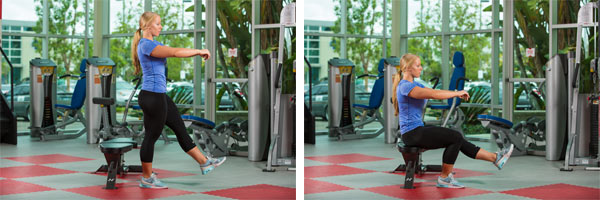
Sit on stability ball; you can either place the ball in a holder or use a SPRI Stedi-Ball or BOSU Ballast Ball to make sure the ball doesn’t roll away. Lift one foot slightly off the floor and use the other leg to lower the hips and glutes to the ball. If you feel like you get stuck, allow your body to sit into the ball. To return, use the bounce of the ball to propel you upward, if necessary. Over time, range of motion and strength will improve so that you will be able to perform the movement by simply performing a “butt tap,” where you are able to control yourself all of the way up and down without collapsing into the ball. Complete three sets of 10 reps each side. Rest 30 seconds and then switch legs.
2. Sprinter Pull (With Cable)
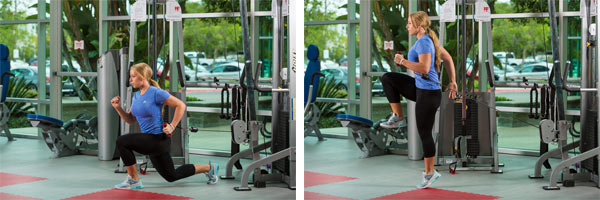
Complete two sets of 12 repetitions with each arm. Rest 30 seconds and then switch sides.
3. Perform SuperSet A for three sets of 10 repetitions per arm.
Perform set #1 of each exercise, then set #2 of each exercise, and so on. Rest only as long as it takes to switch exercises.
A1 Alternating Row (cable)
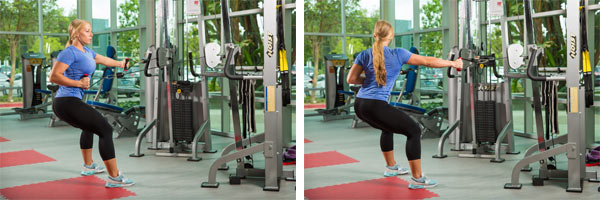
A2 Alternating Chest Press (DB)
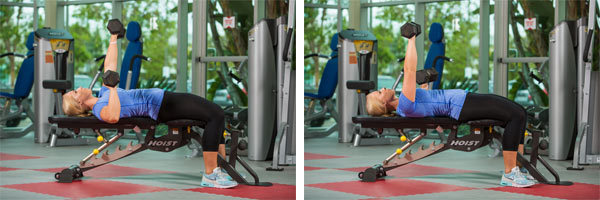
4. Front-to-Back Lunge & Reach With Dumbbells or Kettlebells (8 to 20 pounds)
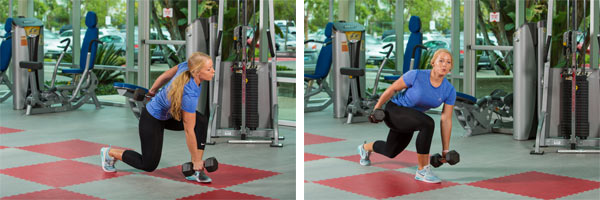
Complete two sets of eight cycles, front-to-back, with each leg moving. Rest 30 seconds between sets.
Wrap-up
This routine offers just about everything a person needs to make a stronger and more capable body—pushing, pulling, rotating, squatting and lunging. Your clients’ cardio will feel better and they will move better, too. With better movement, they’ll feel more fluid as they move and create less stress on their bodies with everything they do.
Source


No comments:
Post a Comment